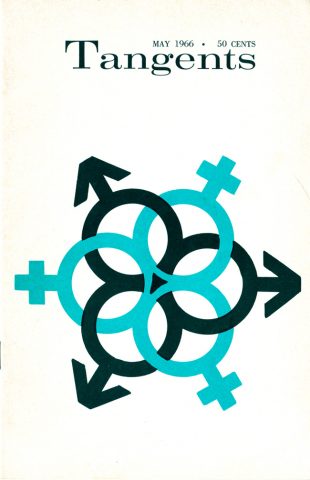 The Right to Remain Silent
The Right to Remain Silent
Tangents
May 1966
Vol. 1 No. 8
Editorial by Don Slater
Originally published in the May 1966 issue of Tangents
While public prosecutors, law enforcement and investigation officials throughout the country bemoan the recent U.S. Supreme Court decision tightening the rule on the questioning of persons in custody, we can only praise the Court for attempting to safeguard the rights of every individual in this regard. We realize that it is almost impossible to protect men from their own folly, but when it comes to the tendency in some of us toward self-incrimination, it is worth a try.
Few examples of police malpractice come to our attention more frequently than those having to do with the interrogation of suspects. It is especially true where homosexuals or persons suspected of being homosexual are concerned. Some homosexuals just will talk about their personal lives to the first policeman, VD investigator, or stranger who comes along. These persons we can do little about. But others either incriminate or embarrass themselves simply because they are not sure how far they have to go when being questioned.
A few weeks ago a friend of TANGENTS was arrested for drunk driving. As frequently happens in Los Angeles and other cities during questioning concerning a charge, one of the arresting officers suddenly asked our friend how long he had been a homosexual. The officer was just working on a hunch. Our friend did not reply of course. Such a question would never legally have to be answered. But nine times out of ten it will catch a homosexual off guard, and he will acknowledge to the police that he is homosexual. The Supreme Court cannot protect us against such abuses. The same is true in the case of public health clinics where skillful investigators will get a homosexual to confess that the sexual act that brought about the VD was with another homosexual. Many investigators will even frequently be able to get a patient to list the names and addresses of his sex contacts for as far back as six months. Public health records are, quite naturally, not confidential. As long as homosexual acts are considered crimes in 49 of our 50 states, and as long as homosexuals are not given the same protection as other individuals, it is extremely dangerous for any homosexual to discuss his private sex life with any public servant. And it is completely unnecessary.
We should all try to understand our basic constitutional rights against self-incrimination. The Supreme Court realized that we could not expect prosecutors or law enforcement officers to protect those rights so they clarified them for the benefit of everyone. The ruling is simply that we all have a right to remain silent and to have counsel when questioned. There should be no argument against the wisdom of this decision.
©1965, 2016 by The Tangent Group. All rights reserved.

